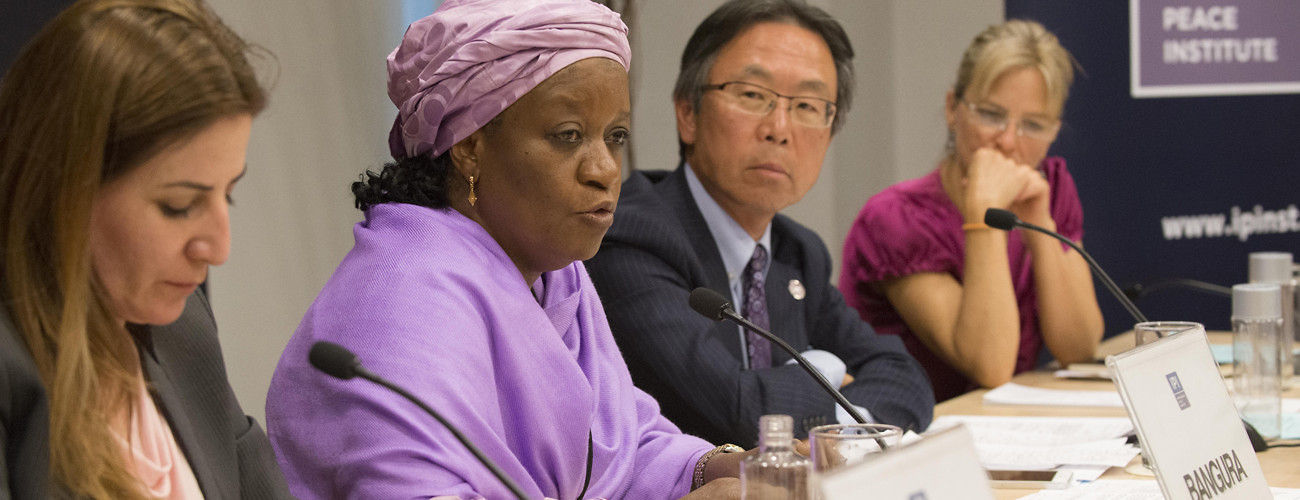For years, combating sexual violence in conflict has been a key element of UN Security Council mandates, but dealing with terrorist groups like the Islamic State and Boko Haram is challenging the way the Council responds to sexual violence perpetrated by non-state actors.
This was the topic discussed at an April 14th event on “Violent Extremist Groups: A New Threat in the Fight to End Sexual Violence in Conflict.” Hosted by IPI, the Office of the Special Representative of the Secretary-General for Sexual Violence in Conflict, and the Permanent Missions of Iraq and Japan to the United Nations, the discussion also included a screening of “Slaves of the Caliphate,” a BBC Arabic documentary that tells the tragic stories of Yazidi women and girls sexually abused by the Islamic State.
The UN SRSG on Sexual Violence in Conflict, Zainab Hawa Bangura, said the tragic example of the Yazidi women demonstrates the inadequacy of the UN’s tools today.
“Over the last five or more years, the Security Council has worked very well to develop tools that will allow us to deal with this problem—tools that were developed to deal with state actors’ militaries,” she said. “We understand them, we’ve been working with them since the United Nations was created, and we understand their strategy.”
But when non-state groups are the ones committing violence against women, the UN system is at a loss, Ms. Bangura said. The system’s tools don’t apply to Boko Haram in Nigeria, al-Shabaab in Somalia, al-Qaeda in Mali and Yemen, or the Islamic State, she said. “[These groups] are transnational, and they don’t respect borders…. And I think that’s the biggest challenge we have,” she said.
The Security Council has several means at its disposal to counter the actions of terrorist groups, including travel bans and asset freezes, said Japan’s Permanent Representative to the UN, Motohide Yoshikawa. “But we don’t know where they have their assets [or] who they are,” he lamented. “They operate outside traditional international law and probably don’t care much about sanctions.”
The stark plight of Iraq’s Yazidis gained much attention in the summer of 2014, when the community came under attack by the Islamic State and was forced to seek refuge on top of a mountain in northern Iraq. There, entire families including women and children were stranded for weeks without food or water, a situation that some government leaders at the time labeled as genocide. The Yazidis, an ancient ethnic and religious community, are seen by the Islamic State as apostates—a view that has prompted the group to kill their men and rape their women.
Vian Dakhil, the only Yazidi member of the Iraqi parliament, called on the international community and the United Nations to do more to counter Daesh—as the group is known by its Arabic acronym—and to come to the rescue of those under its yoke.
The Islamic State has targeted several communities during its campaign, she said, but the Yazidis have borne the brunt of the violence. Their women and girls have been sold as sex slaves and sometimes even exchanged for cigarettes, she said. Once taken captive, girls are raped repeatedly and in some instances die because of the injuries, she added.
The 25-minute documentary traced the steps of an Iraqi woman who met and spoke with some of the few Yazidi women who have managed to escape as well as with those who knew someone who had. Footage from the video shows Islamic State militants bartering women as merchandise, treating them as property to be discarded with little or no value.
Marc Perkins of BBC Arabic and the editor of the documentary said the video is currently the most watched item on the outlet’s Facebook page, with millions of hits across social media. He said global audiences have latched onto the video primarily because they were shocked by the suddenness and scale of the Yazidis’ suffering.
Looking ahead, IPI’s Senior Director of Programs Maureen Quinn said the video is both “inspiring and challenging,” and can be used as a starting point to “think about and discuss critically and constructively the tools and the policies to address sexual violence by non-state actors, and also the response mechanisms to assist the survivors.”
Humanitarian aid has been one of the main ways the international community has come to the rescue of targeted communities, even though aid delivery is often complicated by the unpredictability of groups such as the Islamic State.
Karen Scriven, senior director for Youth, Gender, and Girls at Mercy Corps, said that’s one of the challenges currently facing her organization. “Every time you have non-state actors who don’t respect international humanitarian law, you’re going to have a direct impact in terms of delivering humanitarian aid, and in particular in reaching people who need the aid,” she said. In such cases, organizations often rely on third parties to deliver the aid, but that raises the question of monitoring.
The event took place a day ahead of a Security Council open debate on women, peace, and security—which addressed the issue of sexual violence in conflict—and of the release of a Human Rights Watch report on the “systematic rape” of Yazidi women and girls in northern Iraq.
The event was moderated by Mr. Yoshikawa.
Watch event:








